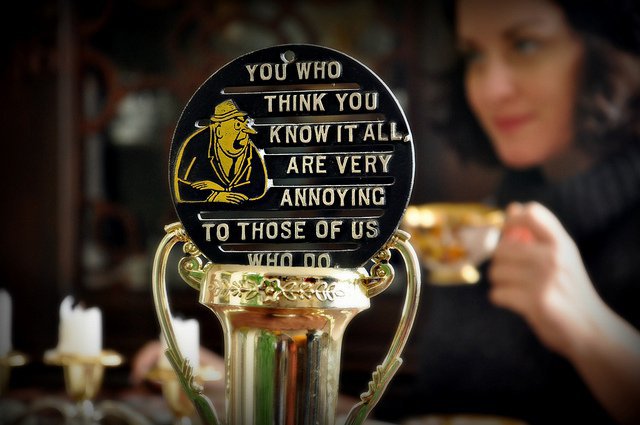5 major mistakes or why your rational decisions do not work?

In many ways, the success of conversion optimization depends only on the decisions we make. If you do everything right, you will constantly find that ideas that seemed brilliant to you really do not work at all.
Do you think optimization and test testing are all you need to know about marketing and your users? It's time for a little self-examination on the topic: why do you think you know these things, and what leads you to such unjustified expectations.
')
Welcome to the world of cognitive psychology and delusions!
The number of ways in which people confirm for themselves incorrect information and erroneous beliefs is simply incredible. Having barely looked, you will immediately find hundreds of known prejudices and falsifications, in this situation it remains only to be surprised - how does anyone else manage to do something right?
When these misconceptions affect us, all you have to do is find a way to mitigate their impact, learn to recognize them and manage them to improve your program. The first key to success is to determine what they are, which ones you deal with most often, then you will have to help yourself establish a system that will help you use their existence for your own purposes. Therefore, we have prepared for you 5 main misconceptions that you will definitely encounter while working on optimization. So, what are they, and how can we reduce their impact?
Remember these traps every minute of your life, when you work or relax, they are relevant not only for optimization, but also for any other areas.
Misconception number 1: Error consistency
We like to create wrong comparisons and then claim that they are suitable for solving our fundamental questions.
What it is. The consistency error is the name for a situation where we create a false connection between phenomena, choosing only one way and not thinking about alternatives, entertain ourselves with the hope that we have already solved the problem simply by naming certain items from a limited set of options.
I understand that this sounds very difficult, but think for yourself what it really means - you make a non-existent choice, for example, comparing only one banner with another, or one heading with the second, deciding which one is better. In fact, there are hundreds of other options that you can use, but you seem to be blinded, narrowing all your vision to just two — those that are before your eyes. You create a false choice when you substitute the whole variety of reality with that limited list that intrusively turns in your head.

The most terrible consequence of this error is that you get an answer that costs not so much. Just because you decided that one heading is better than another does not mean that it is really good. But it shows that you give too much importance to a limited choice, taking as a basis the hypothesis with insufficient information. The job of a researcher or tester is to think about possible alternatives. But where there - you have already fallen into the trap, making a false choice and thinking that you won.
Example: you feel it is vital that you improve the landing page. And what are you doing? Decide to try a new call to action! In fact, you need to figure out what is most important, and use many other options.
What do we have to do. One of the fundamental principles of a successful testing program is to always try to use the maximum amount of resources and be critical of what people think is right. This means being able to avoid consistency errors, being sure that you are using a sufficiently large range of possible answers and are suspicious of your current thoughts. Therefore, always check to see if you are using the only way to optimize that you think is right. Do you work with all possible options or just resort to a popular solution to current problems?
Misconception number 2: Daning-Kruger effect
The less you know, the more you are convinced that you know everything.
What it is. Each of us is surrounded by a person who is sure that he knows the answers to all possible questions, he has already experienced everything, and found out everything. In fact, those around him know that he doesn’t even have a clue what he is talking about. Before you, the Daning-Kruger effect in action, when people incompetent in their field do not know that they are incompetent, moreover, it is very likely that they feel like great gurus precisely because they do not know that there is something they do not know. Now it’s clear where people come from so often, telling how terrific their experience was, how important it was for the project, but in fact it was a completely and completely negative influence.

All these jokes about external experts are in fact a big deal, because they show a direct link between the sociopathic tendencies and the position of the authorities in any business. Supporting people who know a lot about a subject, being less competent, leads to cases where self-righteousness prevails over constructive literacy. Now you understand the root of all these statements in the style of "I believe, I think, I feel."
Example: obviously, the call to action is the most important, why do we still need to check the page layout? The more confident you are in something, the more important it is to challenge your conviction.
What you should do. This is precisely the moment when it is important to test our rational decision-making system. Every step you take should be aimed at maximizing the improvement of your business, and not on the fun of your vanity. It does not matter that someone thinks what is going to happen or what they are trying to achieve, the main thing is whether the changes will affect the essence of your business or not.
By introducing a rigorous measurement principle, assuring every time that you are avoiding someone’s limited ideas, you can make sure that no one’s horizons of understanding have any effect on the potential revenue from optimization.
Misconception number 3: The narrator's syndrome
We have answers to questions even in the case when information is clearly not enough.
What it is. People love good stories, and no more popular than the one that answers the question why. In fact, 90% of the total time spent in vain is spent on understanding why something happened that way, or inventing complex stories, or convincing yourself that you have a deep understanding of your target audience.
Why did this particular title win? Obviously, because he was motivating. Why then do people not go to your site? Because he was not relevant ...
Every time someone explains why it happened that way, every time you attach too much importance to the results of your tests, you are face to face with the narrator's syndrome . People feel empty when they get a result that goes against their expectations, or does not fit into their usual pattern, so they immediately begin to look for the reason why it happened. Moreover, in some organizations, performers do not care at all about the results, they are always looking for the answer to a single question - why this happened. Be on the alert every time someone begins to explain the reasons for what happened.

The problem is that actually answer the question "Why?" Is almost impossible. Even if you clearly see the reason for this or that event - this is just a rationalized version of what happened, which your brain helps you, the real reasons that led to this outcome will most likely not be found. You cannot say that one event is in any way connected with another, if you received a single result in the course of testing and that’s all - it doesn’t matter whether your measurements went up or down, or show different results relative to each other, the upper limit data will be just one of the possible results of observation.
Example. You know that your call to action worked, obviously, because it was most relevant to the context that users are usually looking for. In fact, you only know that it worked, your past experience can only reduce the effectiveness of your future actions in the future.
What you should do. Never, I emphasize, never explain why something happens this way. You may be 100% sure you are right (remember the Daning-Kruger effect) that an event has this very reason, but you should avoid this road. Not only because you base your conclusions on often false information, but also because this way you open the door to others, allowing them to also fall into the narrator's syndrome. Stop these conversations as soon as they begin to distract you from concrete actions.
In many cases, such an approach will cause the cognitive dissonance of your group only for the reason that such is human nature. That is why it is so important to set rules and teach people how to act when they receive any data. And it is necessary to do this even before they start real work. Success and failure are determined by your actions, not the results.
Misconception number 4: The Graveyard of Knowledge
The winners do not tell us anything, but still they are the ones to whom we constantly seek information.
What it is. Visit any bookstore in the section of business literature, and you will see a huge number of books written by people from successful companies. We like to read about entrepreneurs and leaders who have reached the heights and received real results.
What you will never see on the shelves of bookstores are the books of people who have not become successful. But the funny thing is that people who do not communicate on this topic, or those who have not achieved success, can be a much more valuable source of information than those who have conquered their peaks. They can tell about what reduced their effectiveness, about random successes, as well as about those nuances that, most likely, did not contribute to their success.

Also known as the "survivor's mistake", the graveyard of knowledge is the common misconception when we try to get all the information only from those who have reached the intended goal. We look at those who have similar traits, forgetting about those who do not. We pay attention to those who buy our products, completely ignoring those who do not, despite the fact that in reality they represent almost every person on this planet. We are so focused on the result that we are losing huge blocks of valuable information.
Example. Do you really want to customize your call to action so that it doesn’t matter whether a user is coming from google or not. In fact, your message can work for any person, but for this you have to change your experience based on completely different facts - the browser, time of day, etc.
What do we have to do. Never consider 100% authentic what you read about your users, not excluding other possibilities. Whether you are filling the site with content or creating a page, always look for alternatives and let your data dictate the direction. This is especially important for personalization and segmentation. You should always use all possible approaches to each user, and be sure that you are testing really possible segments, even if you really want to customize the message for the target group based on any behavior or source. Make sure you are working on increasing the effect, not your own opinion.
Misconception number 5: The halo effect
The more we like one characteristic, the more we like all the others, no matter if it is a person or a subject.
What it is. We all love the good looking pages that affect us. We know that the better the page looks, the better it represents us, forgetting that the most profitable of all possible is just a white screen with a search window in the middle. We often trust experts who speak better than others and those who are associated with us, forcing themselves to adhere to certain information in this way. These are all examples of the halo effect when you get positive or negative feelings from a variety of characteristics based on a single property of an object or person.

We really trust beautiful people and pages more, despite the fact that they have little to do with real performance. We focus on someone who is more eloquent than on someone who is shy. In the elections, we vote for the highest candidate, although this characteristic is absolutely unrelated to his leadership skills.
Example. Any page analysis. You don’t like what the page looks like and everything, especially you don’t like the call to action. In fact, your impression of the page or any part of it has nothing to do with how fully the task is performed.
What should be done. Allow people to vote for what they think and choose the best option among all those proposed. Do this only a couple of times, and it will immediately become obvious that no one, whether he is an experienced marketer or a novice intern, is not able to offer anything sensible just by looking at the page.
Some people are a little better than others, they understand the choice of parameters, but it is only unlikely that someone will come closer to the best option by at least 10 percent. Confronting the widespread halo effect will increase your attempts to learn more about the things that people call "terrible", as well as those things that are opposed to their vision of sites, this will allow you to discover new knowledge about what should be the best user choice.
Conclusion
As you can see, it is quite easy to list all the errors that limit our view of the world and interfere in our work. The misconceptions of a real experiment, such as the observer's mistake, were not included in this review, when the observer unconsciously transfers his attitude to the experimental results, or the selection bias; they are not included here because they are not of such great importance as those who are with us every minute throughout the day. People as a whole are indeed a very enthusiastic and capable group, but they severely limit their consciousness to their usual vision of the world. Conscious approach and discipline will not allow you to fall into the traps of the above-mentioned errors, on the contrary, knowing them and using together with your natural talents, you will achieve the best results.
Most people do not understand that their decisions are wrong. They think that they are rational, observing the irrational behavior of others or reflecting on past decisions. In fact, nothing of what we think or do, fails because of the many labels that are allowed to enter our brains and stay there throughout the day. We should deal with them more carefully and create systems that mitigate damage, otherwise we will never achieve our intended goals.
And the last. Do you think that you know everything and you certainly will never be led to these silly delusions? Just memorize one simple thing. The smarter and smarter you are, the greater the chance of getting caught in one of these thinking pitfalls. So what's up with your competence, maybe it's time to start trying to stop these misconceptions, before they destroy your company completely?
PS We recommend another article on the topic - The secret about how to do everything on time.
Translated by Vyacheslav Davidenko, founder of MBA Consult
Source: https://habr.com/ru/post/286178/
All Articles